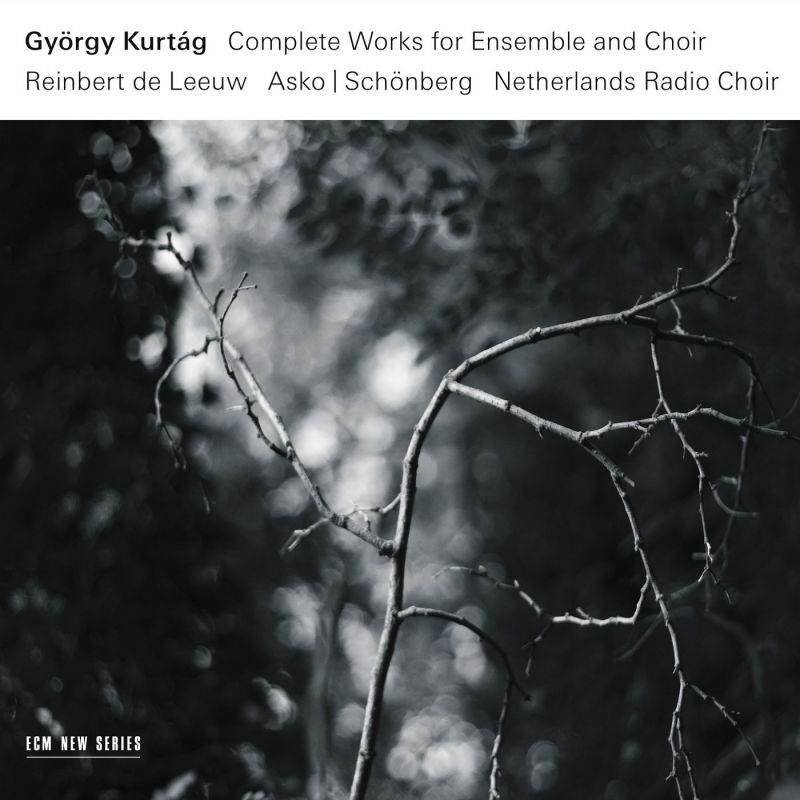KURTÁG Complete Works for Ensemble and Choir
View record and artist detailsRecord and Artist Details
Composer or Director: György Kurtág
Genre:
Vocal
Label: ECM New Series
Magazine Review Date: 08/2017
Media Format: CD or Download
Media Runtime: 151
Mastering:
DDD
Catalogue Number: 481 2883

Tracks:
| Composition | Artist Credit |
|---|---|
| Four Capriccios |
György Kurtág, Composer
Asko/Schönberg Ensemble Csaba Király Elliott Simpson, Guitar Gerrie de Vries, Mezzo soprano György Kurtág, Composer Harry van der Kamp, Bass Jean-Guihen Queyras, Cello Natalia Zagorinskaya, Soprano Netherlands Radio Choir Reinbert de Leeuw, Conductor Tamara Stefanovich, Piano Yves Saelens, Tenor |
| (4) Songs to Poems by János Pilinszky |
György Kurtág, Composer
Asko/Schönberg Ensemble Csaba Király Elliott Simpson, Guitar Gerrie de Vries, Mezzo soprano György Kurtág, Composer Harry van der Kamp, Bass Jean-Guihen Queyras, Cello Natalia Zagorinskaya, Soprano Netherlands Radio Choir Reinbert de Leeuw, Conductor Tamara Stefanovich, Piano Yves Saelens, Tenor |
| Grabstein für Stephan |
György Kurtág, Composer
Asko/Schönberg Ensemble Csaba Király Elliott Simpson, Guitar Gerrie de Vries, Mezzo soprano György Kurtág, Composer Harry van der Kamp, Bass Jean-Guihen Queyras, Cello Natalia Zagorinskaya, Soprano Netherlands Radio Choir Reinbert de Leeuw, Conductor Tamara Stefanovich, Piano Yves Saelens, Tenor |
| Massages of the Late Miss R. V. Troussova |
György Kurtág, Composer
Asko/Schönberg Ensemble Csaba Király Elliott Simpson, Guitar Gerrie de Vries, Mezzo soprano György Kurtág, Composer Harry van der Kamp, Bass Jean-Guihen Queyras, Cello Natalia Zagorinskaya, Soprano Netherlands Radio Choir Reinbert de Leeuw, Conductor Tamara Stefanovich, Piano Yves Saelens, Tenor |
| ...Quasi una Fantasia.. |
György Kurtág, Composer
Asko/Schönberg Ensemble Csaba Király Elliott Simpson, Guitar Gerrie de Vries, Mezzo soprano György Kurtág, Composer Harry van der Kamp, Bass Jean-Guihen Queyras, Cello Natalia Zagorinskaya, Soprano Netherlands Radio Choir Reinbert de Leeuw, Conductor Tamara Stefanovich, Piano Yves Saelens, Tenor |
| Samuel Beckett - What is the Word |
György Kurtág, Composer
Asko/Schönberg Ensemble Csaba Király Elliott Simpson, Guitar Gerrie de Vries, Mezzo soprano György Kurtág, Composer Harry van der Kamp, Bass Jean-Guihen Queyras, Cello Natalia Zagorinskaya, Soprano Netherlands Radio Choir Reinbert de Leeuw, Conductor Tamara Stefanovich, Piano Yves Saelens, Tenor |
| Songs of Despair and Sorrow |
György Kurtág, Composer
Asko/Schönberg Ensemble Csaba Király Elliott Simpson, Guitar Gerrie de Vries, Mezzo soprano György Kurtág, Composer Harry van der Kamp, Bass Jean-Guihen Queyras, Cello Natalia Zagorinskaya, Soprano Netherlands Radio Choir Reinbert de Leeuw, Conductor Tamara Stefanovich, Piano Yves Saelens, Tenor |
| Four Poems by Anna Akhmatova |
György Kurtág, Composer
Asko/Schönberg Ensemble Csaba Király Elliott Simpson, Guitar Gerrie de Vries, Mezzo soprano György Kurtág, Composer Harry van der Kamp, Bass Jean-Guihen Queyras, Cello Natalia Zagorinskaya, Soprano Netherlands Radio Choir Reinbert de Leeuw, Conductor Tamara Stefanovich, Piano Yves Saelens, Tenor |
| Colindă-Baladă |
György Kurtág, Composer
Asko/Schönberg Ensemble Csaba Király Elliott Simpson, Guitar Gerrie de Vries, Mezzo soprano György Kurtág, Composer Harry van der Kamp, Bass Jean-Guihen Queyras, Cello Natalia Zagorinskaya, Soprano Netherlands Radio Choir Reinbert de Leeuw, Conductor Tamara Stefanovich, Piano Yves Saelens, Tenor |
| Brefs Messages |
György Kurtág, Composer
Asko/Schönberg Ensemble Csaba Király Elliott Simpson, Guitar Gerrie de Vries, Mezzo soprano György Kurtág, Composer Harry van der Kamp, Bass Jean-Guihen Queyras, Cello Natalia Zagorinskaya, Soprano Netherlands Radio Choir Reinbert de Leeuw, Conductor Tamara Stefanovich, Piano Yves Saelens, Tenor |
Author: Andrew Mellor
Songs of Despair and Sorrow might bear allusions to Russian traditions in more than the language it sets but Kurtág’s vocal friction, ordered polyphony and unsettled whispering can be heard in works vocal and non-vocal throughout this collection, and indeed throughout Kurtág’s output. He sets Romanian in the biggest single movement recorded, Colindă-Baladă, based on a colindă collected by Bartók in 1913. Half collective ritual, half bustling narrative, this ultra-variegated, delicate and dense piece gets a slightly more shaky performance from the Netherlands Radio Choir than the Songs but perhaps the pay-off of full-on engagement with the music’s many tendrils necessitates it.
By contrast, the more spare Kurtág’s textures, the more this recording excels – and drops the jaw. There is some sense of that in the ‘forced inarticulation’ of Samuel Beckett: What is the Word but perhaps it’s heard best in the Four Capriccios, Messages of the Late Miss R Troussova, Brefs Messages and Grabstein für Stephan. Kurtág himself writes in the booklet that he asked musicians to re record some tracks, singing to them down the telephone when he thought they could improve on their first efforts. (I once saw him interrupt a concert when he wasn’t happy with a singer’s interpretation of a tiny song.) It’s easy to imagine this ultra-exacting composer having some thoughts on the latter piece, whose lonely beauty is only revealed when it finds its true equilibrium. The playing here is exquisite.
Likewise that Kurtág speciality: the fragment. Natalia Zagorinskaya sounds well aware in the Messages of the Late Miss R Troussova that these little revelations hinge on what is not said as much as what is. The composer’s freedom from the necessity to transition is as musically cleansing as it is communicatively direct, full of tantalising imagery. Right over at the back end of disc 3, these pieces have an instrumental partner in Brefs Messages. I misread the title as ‘brief messages’ at first but that is what you get and the music, in the hands of this composer who speaks most powerfully when he’s at his shortest, quietest and simplest (and often paradoxically cryptic as a result), is richer than many a deep, sprawling essay for it. A proper treasure trove.
Discover the world's largest classical music catalogue with Presto Music.

Gramophone Digital Club
- Digital Edition
- Digital Archive
- Reviews Database
- Full website access
From £8.75 / month
Subscribe
Gramophone Full Club
- Print Edition
- Digital Edition
- Digital Archive
- Reviews Database
- Full website access
From £11.00 / month
Subscribe
If you are a library, university or other organisation that would be interested in an institutional subscription to Gramophone please click here for further information.




